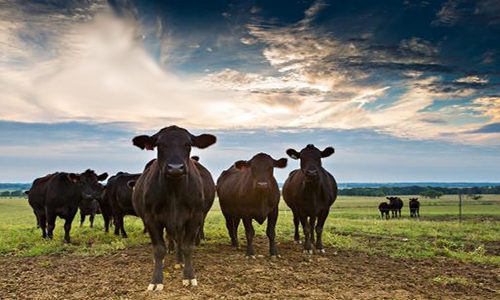Making profits from beef herds will be taught Sept. 21 at the University of Missouri Thompson Farm field day near Spickard, Mo.
Genetics, breeding, feeding, and selling improve profits, say MU Extension specialists.
“For a change, the program will be in the evening,” says Rod Geisert, superintendent, Columbia. Sign-in opens at 3:30 p.m. and is followed by farm tours. “We hope farmers with off-farm jobs can attend,”
Talks begin at 6:15 p.m., with dinner at 7:15. Speakers won’t talk just profits. They look at the big picture of beef production.
Jared Decker, MU Extension geneticist, has a message for herd owners. “Profits are the most important trait for beef cows.”
Calving ease, weaning weight, carcass merit and other traits improve a herd. “Dollars count most at the end of the year,” says the beef specialist.
In the past, herd owners needed many EPDs (expected progeny differences) to guide breeding. Now one selection index, such as dollar beef ($B), blends many traits into one number.
Eric Bailey, MU Extension beef nutritionist, says full genetic potential takes good feeding. “Often herd owners worry about one part of feeding, such as minerals,” Bailey says. “All must be taken in adequate amounts.”
In fact, Bailey says to look first at total feed intake. Some cows will benefit from more feed. But feeding too much expensive feed wastes dollars. That hurts profits.
In the end, economics—the dollars left for owners—count, says Scott Brown, MU livestock economist. He sums up the evening with a look at selling calves.
Cow herd economics change as demand grows for quality beef. Calf prices are volatile this year, but one constant is increasing prime beef prices. Choice beef prices jump up and down while prime stays steadier.
“Breeding for quality becomes a risk management tool,” Brown says.
Research from the MU Thompson Farm cows shows how a commercial herd can provide USDA prime. In the last calf crop, all but one graded choice or prime. The prime calves drew premiums of $36.40 per hundredweight. Carcasses weighed 800 pounds.
With top sires used for artificial insemination, the calves show that proven genetics bring premium prices.
The MU calves show that genetics, not long-term feeding, makes that high USDA grade.
Brown tells the value of premiums, especially in times of low beef prices.
There will be new lessons on breeding from the Thompson herd. Jordan Thomas, MU researcher, will tell advances in the use of sex-sorted semen. With fixed-time artificial insemination (FTAI) and sorted semen, herd owners can choose the gender of calves. They can breed for all heifers or all steers.
A new line of research studies hair shedding. Some cattle grazing toxic fescue grass don’t shed winter coats quickly. That brings heat stress and slow gains. Harly Durbin, MU researcher, will tell of study results so far.
Research from MU Thompson Farm led to the Show-Me-Select Replacement Heifer Program. Protocols for heifer management and genetics allow owners to apply the science.
The MU research farm is 7 miles west of Spickard at the end of Highway C off U.S. Highway 65. Farm supply and genetic companies will set up exhibits for the evening.
Thompson Research Center, part of the Missouri Agricultural Experiment Station, is in the MU College of Agriculture, Food and Natural Resources, Columbia.







